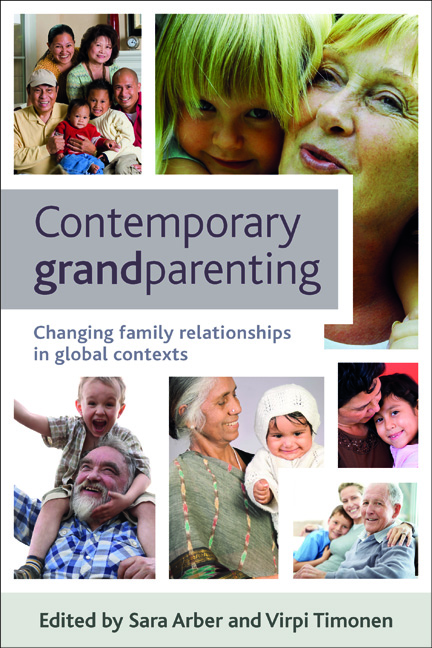one - A new look at grandparenting
Published online by Cambridge University Press: 01 September 2022
Summary
An ageing world contains growing numbers of grandparents, who share longer lifespans with, on average, smaller numbers of grandchildren. The scope for grandparenting is therefore widening, and grandparenting is taking on new forms as the social and economic contexts of family relationships evolve. Diversity in grandparenting also arises from grandparents’ own choices regarding engagement with grandchildren. Time is ripe for a new look at grandparenting.
This chapter provides an overview of the main themes, arguments and frameworks that research on grandparents has yielded, highlighting how this book addresses lacunae in the literature and engages with new or poorly understood aspects of grandparenthood. It introduces concepts and theoretical frameworks that will be advanced within Contemporary grandparenting, and provides an overview of how the chapters in this book link together to further our understanding of contemporary grandparenting in diverse welfare state and cultural contexts.
While grandparenthood is widely acknowledged as being of great and growing importance in contemporary societies, it has remained inadequately theorised. This is not surprising because the demographic, socioeconomic, family and social policy contexts that frame and shape grandparenthood have changed radically in recent decades, and continue to evolve. The sub-title of the book emphasises that grandparenting is embedded within ‘changing family relationships’. Contemporary grandparenting also seeks to provide new insights into how grandparents themselves exert an influence on the grandparent role, hence departing from earlier characterisations that have tended to pay little attention to grandparents’ agency. Changing family, economic and social contexts, and some grandparents’ ability to shape their role within these contexts, mean that grandparenting today is very different from grandparenting some decades ago.
Adopting a gendered perspective is fundamental when studying the practices of grandparents. The term ‘grandparenting’ often in reality reflects care and support provided by grandmothers. However, it is important to consider the ways in which women and men ‘perform’ grandparenting in different societal and family contexts, and how cultural and social changes shape the gendered nature of grandparenting. It is critical to consider the nature of triadic grandparent–adult child–grandchild relationships, and how these are manifest in ‘family practices’ (Morgan, 2011). A complex nexus of gendered interrelationships across three generations pertains: not only the gender of the grandparent, but also the gender of the grandchild, and the gendered roles of the middle generation, influence grandparenting practices.
- Type
- Chapter
- Information
- Contemporary GrandparentingChanging Family Relationships in Global Contexts, pp. 1 - 24Publisher: Bristol University PressPrint publication year: 2012
- 4
- Cited by



